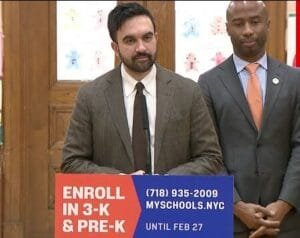NYS ONA lunches Can code to empower immigrants with digital literacy skills

The New York State Office for New Americans has launched a new initiative, Immigrants Can Code —Digital Literacy Pilot, to grant immigrants access to digital literacy education and training.
While disclosing this on Monday October 5, 2020, ONA said it had established a a partnership with AlbanyCanCode to provide virtual computer education and training courses dedicated to immigrants.

ONA maintained that the courses are essential to building careers in the Empire State’s fast-growing innovation economy.
“During a time of economic transition that is defined by the growing importance of technology in the workplace, this digital literacy initiative will enable newcomers to New York State to gain the critical competencies needed to succeed in a rapidly evolving workforce,” it stated in a statement.
“In New York, we are proud to lead the nation with initiatives and protections to support immigrants in our state,” said Lieutenant Governor Kathy Hochul.
“This partnership between the State Office for New Americans and AlbanyCanCode will provide immigrants with the opportunity to learn how to code and advance their digital skills.
“Education and training courses as part of the program will help to prepare new Americans and New Yorkers with the tools they need to expand their career opportunities and ensure success now and in the future,” she said.
ONA is partnering with AlbanyCanCode, a nonprofit organization that has successfully trained hundreds of software coders in Albany and Kingston.
AlbanyCanCode will offer digital literacy courses specifically for ONA constituents, with the initial classes starting in October 2020.
Secretary of State Rossana Rosado said, “Immigrants have made numerous contributions across this nation and I can think of no better way to honor immigrants than by offering them new opportunities.
“The ONA partnership with AlbanyCanCode will offer New Americans the chance to hone their skills that will prepare them for the highly competitive and lucrative high-tech field and increase their potential for growth and advancement in today’s economic environment.”
In this ever-changing world, New York State will be better positioned thanks to this well-trained workforce,” she added.
Founder and CEO of AlbanyCanCode Annmarie Lanesey said, “We’re incredibly excited to partner with the Office for New Americans to assist their constituents in developing critical computer skills that will fuel career opportunities and build the tech talent pipeline employers desperately need.
“We firmly believe that anyone with talent and aptitude can succeed in the technology industry and today’s digital-first economy.
“We applaud the Office for New Americans for its vision and foresight in creating this bold initiative and look forward to working together to make it a resounding success.”
This initiative, supported through approximately $50,000 in Federal CARES Act funding, is open to any immigrant with a household income at or below 200% of the Federal Poverty Guidelines.
This training is particularly critical and timely as a result of the COVID-19 pandemic that has shown how important digital literacy is for those who are now working from home, or who are seeking new employment that requires them to work remotely.
Additionally, dedicated funds will be made available for students to participate in more advanced software courses beyond digital literacy.
AlbanyCanCode has been offering computer coding education and training courses since 2016, and since the beginning of the COVID-19 pandemic, it has been offering virtual digital literacy classes in a fully remote instructional format.
The primary courses offered through the partnership between ONA and AlbanyCanCode will assist participants in developing digital literacy skills that are vital to pursuing a growing number of career opportunities in the technology industry, while also increasing the number of skilled workers available to meet the needs of employers across nearly every industry.
This program is supported by the US Administration for Children and Families (ACF), the US Department of Health and Human Services (HHS) as part of a financial assistance award totaling $49,999 with 100 percent funded by ACF/HHS.














